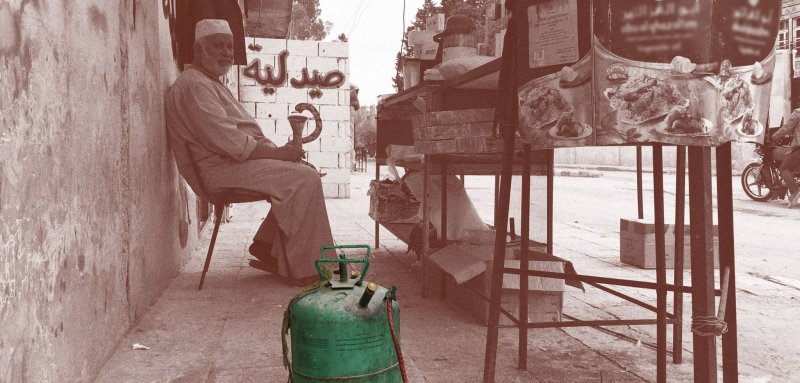In the traditional Sheikh Saad market in the Mezzeh district of west Damascus, Abu Hasaan stood next to his cart selling a fava bean stew, one of Syria’s most popular winter foods. Abu Hasaan had no desire to call out his product to passers-by, or even to speak with customers.
A young man in his twenties approached, tentatively asking for a plate of Fūl and inquiring what today’s price was – and if it had gone up since the week before because of the gas crisis.
“As usual, 250 Liras (about half a US Dollar),” said Abu Hasaan.
“How can I raise my price when most of my clients are poor?” the 50 year-old added, with a note of desolation in his voice.
Laughing, the customer said: “I thought you might raise the prices on us, but in any case God give you strength.” He proceeded to eat his warm dish of boiled beans with spices and cumin.
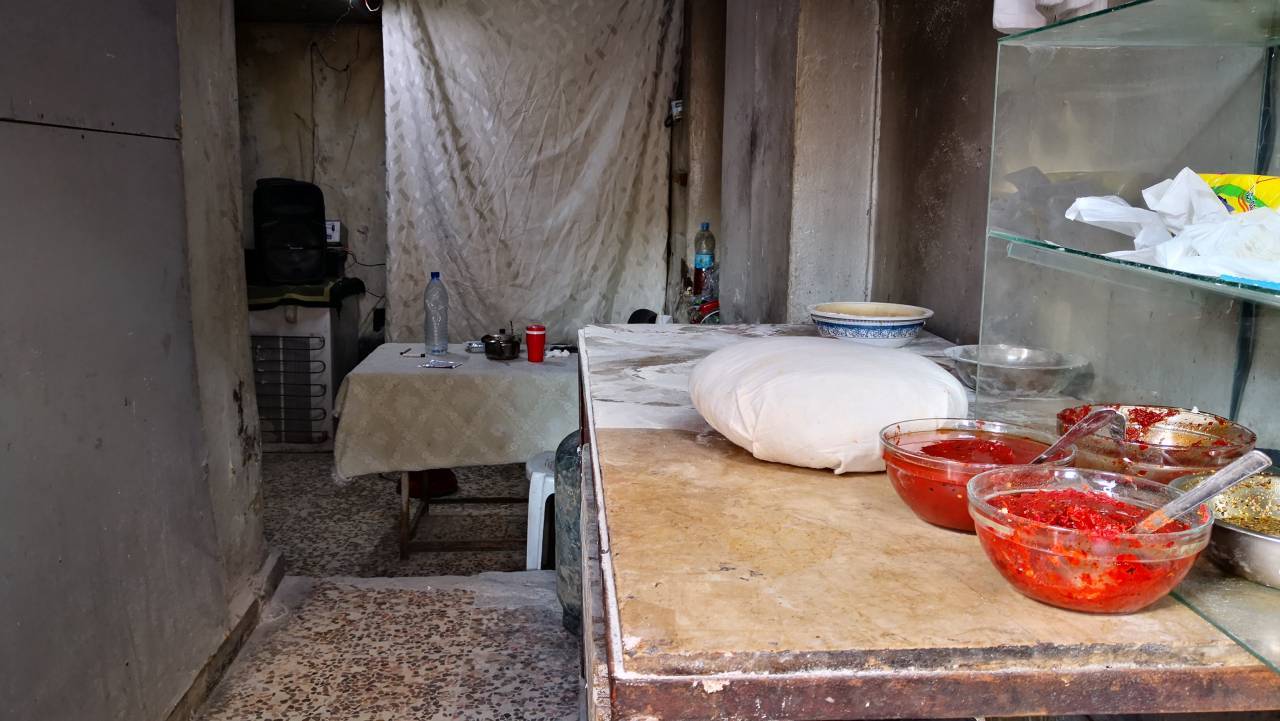
These days, Abu Hasaan doesn’t have much choice other than to sigh. When we finally approached him with questions about his circumstances during the gas and fuel crisis which has swept Syria over the past two months, he started talking about his continuous suffering – which doesn’t seem likely to end anytime soon.
“I need a gas cylinder every three days if I want to continue at the usual rate,” he told Raseef22. “This means two things for me: either that I stop my work for an entire day every time I need a new cylinder, in order to stand in the queues which stretch for long hours, or that I get it for double the price in the black market, and therefore significantly lower my profits which are already modest to begin with.”
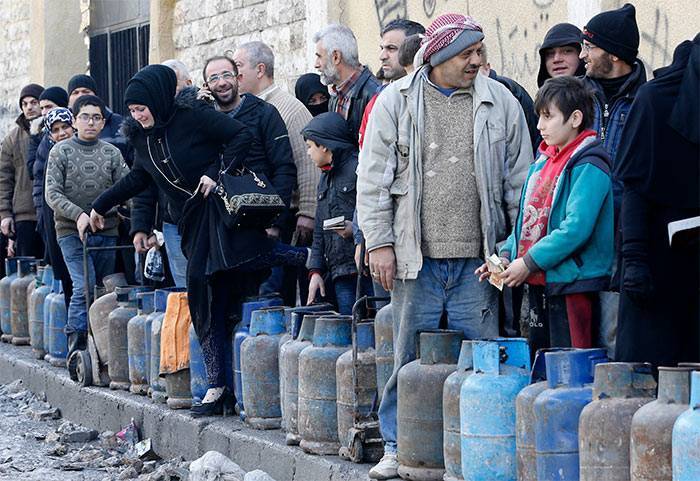
Yet to this day, Abu Hasaan refuses to raise the price of a dish of beans by even one Lira: for his suffering is part of what the Syrian people as a whole are going through, these days and since the early years of the war.
But Abu Hasaan’s compassion doesn’t prevent him from fearing what is yet to come. Today, he is barely managing to provide his family of six with their daily sustenance. However, if the crisis continues unabated he has come to the increasing realisation that he may have to shut down his food-cart, temporarily at least, until he can secure his gas cylinders at a reasonable price and without waiting.
“I am trying hard to not reach this stage” he said. “But it’s not in my hands.”
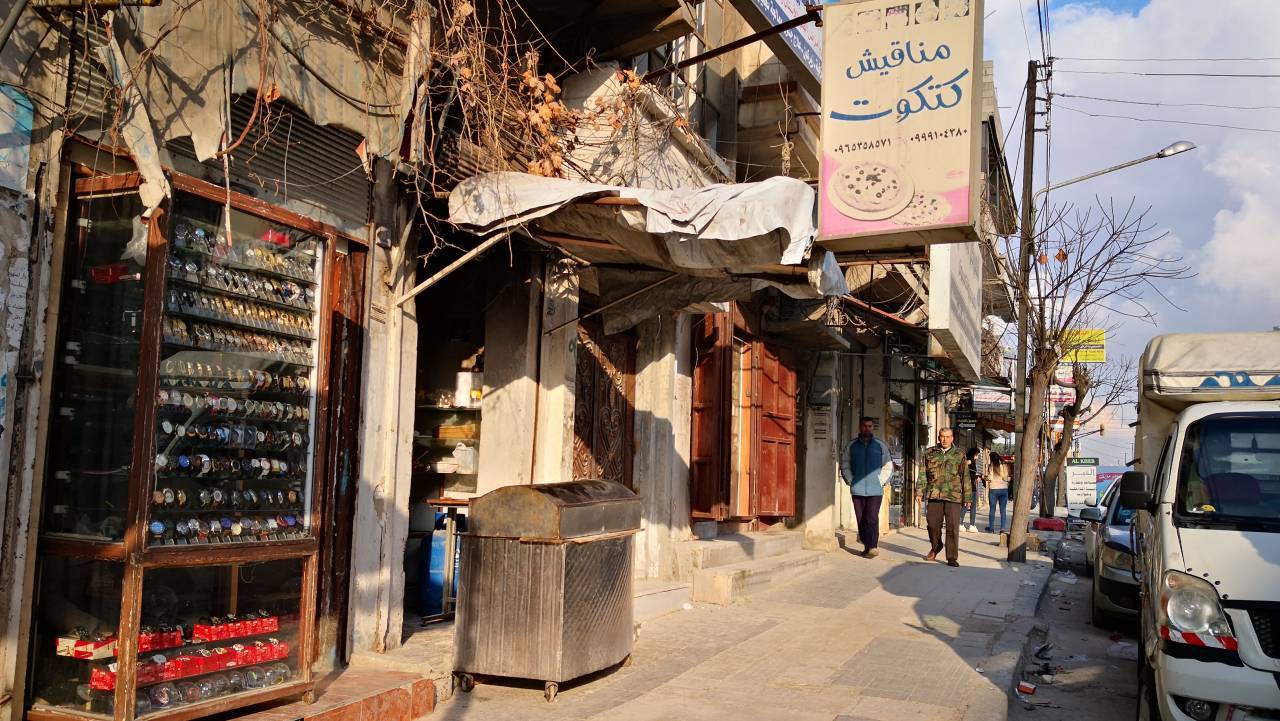
The government justifies the fuel crisis
The fuel crisis began around early December 2018, when Syria’s supply of natural gas started to enter a gradual decline. Syrian households rely on natural gas for cooking, but so do many restaurants, hotels, service stores, and small-scale vendors (such as street carts selling Fūl, boiled corn and fries) as well.
The declining gas supply has coincided with a significant drop in temperatures, with Syrians currently experiencing one of the coldest winters on record in recent times. This has prompted many families to rely once again on gas heaters at home, mainly for two reasons. The first is the government’s increased rationing of the electricity supply (reaching twelve hours of power outages in some areas), leaving families unable to rely on electricity for heating.
The second is the rising cost of diesel oil which used to be a major source of heating, with barely any Syrian home lacking a diesel heater of some sort. Today, a Syrian family can obtain 400 litres of diesel annually for a government-subsidised price of 200 Syrian Liras (40 US cents) per litre, while any additional quantities have to be individually bought for up to 400 Liras per litre.
Relative to the average income of a Syrian family (US$150 per month), these are steep prices for most Syrians – around 80% of whom live under the poverty line, according to UN statistics.
This led to the increase in demand for gas cylinders in the past few weeks, which have also become considerably harder to obtain than before. Today, long ‘gas queues’ of citizens start stretching from the early hours of the morning outside allocated provision centres, which sell gas at the official price of US$5 per cylinder. However, as with every crisis the country experiences, a black market has been rejuvenated by the higher prices (reaching up to US$20 per cylinder) which many choose to pay in order to avoid the queues.
Meanwhile, government statements attribute the continuation and exacerbation of the country’s fuel crisis to a number of reasons – notably Syria’s need to import 70-80% of its raw natural gas from abroad (a demand which increases in the winter).
The government says such imports are being hindered by international sanctions which have sharpened in the past few months and which have notably impeded the entry of gas-carriers into Syrian territorial waters. This has also made it more difficult for the government to enforce contracts to import Liquified Natural Gas (LNG) for residential use as well as fillable and usable gas cylinders, both of which are in shortage.
Local gas-fields in central and eastern Syria, are on the other hand, still being rehabilitated before being declared suitable once again for production.
As for the increased rationing of the electricity supply, official statements also cite several reasons: primarily the rise in energy demand during winter, and the rise in the number of Syrians benefiting from the grid’s supply over the past year, due to the Syrian government’s resumption of control over wide parts of the country, and the return of some refugees from neighbouring states.
The continued maintenance and repair of power plants damaged during the war are an additional factor for the crisis, the government says.
In both the gas and electricity crises, official statements nonetheless do also blame what they describe as “bad practices” which further aggravate the crisis, such as the hoarding of gas cylinders and their unequal distribution, as well as the theft and illegal siphoning of the electricity supply.
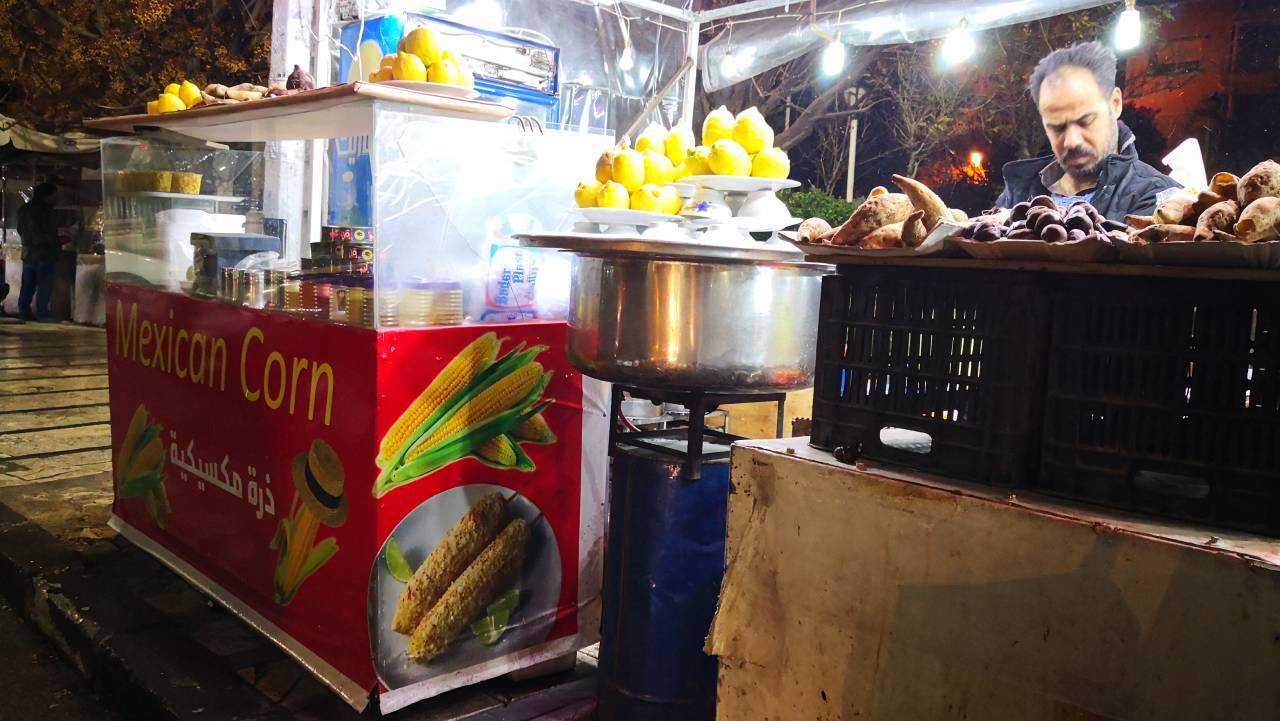
“I won’t close the shop - we have become used to crises”
In the vicinity of Abu Hasaan’s Fūl cart is a small shop belonging to a man called Mahmoud, which sells traditional Syrian dishes like hummus, fūl and fatteh. Sitting in his shop waiting for customers, Mahmoud spoke of the downturn in sales and generally slow market – a result of the deteriorating financial circumstances of most Syrians.
“In addition to the [prepared] cuisines, I used to rely in large part on selling bags of fūl which are boiled at home to prepare fūl nabet,” he said. “I used to sell on a daily basis nearly 20 bags, but with the loss of gas [supply] from homes my sales don’t exceed two or three a day.”
Mahmoud, 40, added: “I won’t raise my prices, and I won’t close down. We have become used to crises in this country, and our lives have become basically a series of crises and waiting, followed by relief.”
Ghadir and his father were not so lucky. As the city’s fuel crisis worsened they were forced to close their shop for a week. However, they succeeded in getting back on their feet by changing their work plan: they stopped making traditional tandoor bread (prepared in a oven commonly used in Asia called a tandoor, which consumes a large amount of gas) and instead started to make manakish – a pizza-like Levantine dish made on a charcoal stove.
“This way we don’t have to wait for a gas cylinder every two days,” Ghadir, who is in his 20s, said.
Ghadir said that despite their menu change not being to their financial benefit, as it led to the loss of many customers that visited him specifically to buy his bread, it was nonetheless the only alternative to stopping work altogether.
“In order to continue our work we have two options,” he said. “Either cancelling the [tandoor] bread or raising the prices, and the latter is completely objectionable to us.”
“We thought one day of resorting to the second option and writing a sign that says ‘we raised our prices because of the universal conspiracy,’” he joked, referring to claims by government supporters that the conflict in Syria was triggered by a broad conspiracy. “But this was unfortunately unworkable and would lead us to losing whatever customers we have left.”
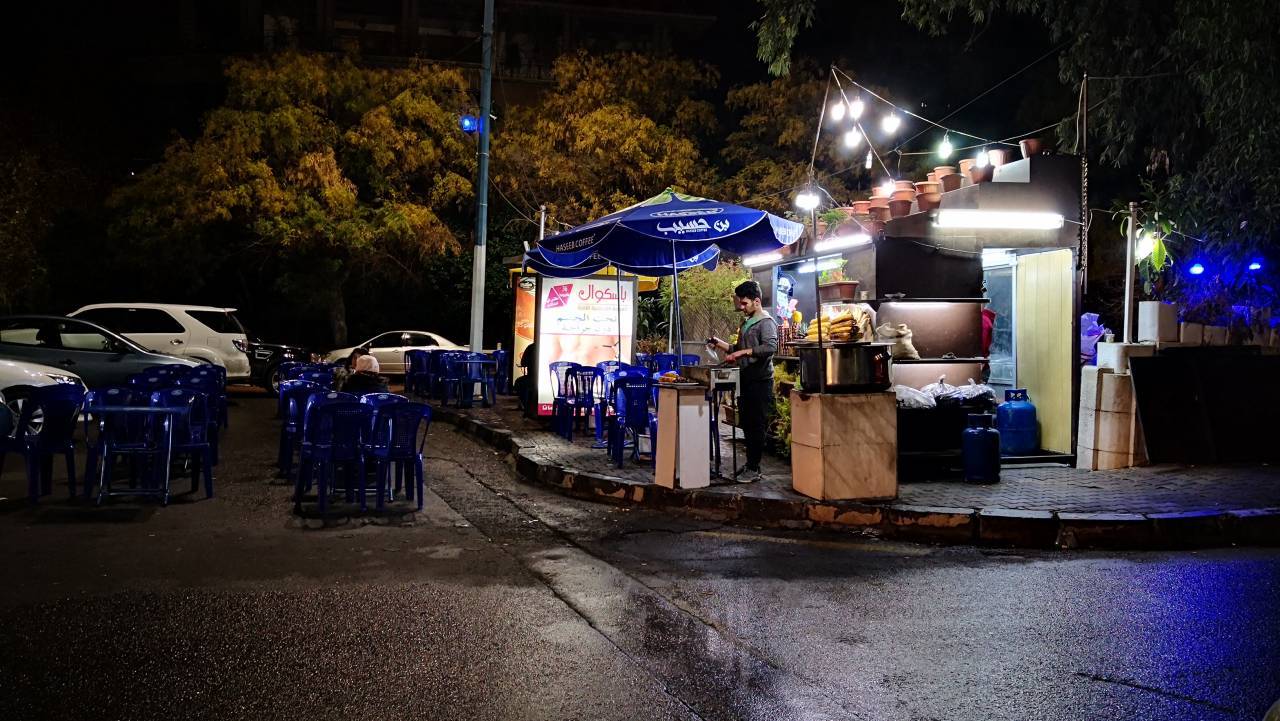
The café’s water-heating espresso machine
Though the main consequences of the country’s fuel shortages have been undoubtedly felt in the food department, drinks have also been a casualty of the crisis. Matteh, the most popular drink consumed on the Syrian coast, has not been spared.
Matteh is relatively simple to prepare, requiring only some boiling water to be added to the plant’s leaves. However, this didn’t stop a café waiter in the coastal Syrian city of Tartus informing Nagham, a customer, and her friends that their favourite drink was unavailable - because there wasn’t enough gas to heat up the water.
“Matteh is a basic drink in our city and especially during winter, and is considered one of our fixed traditions that is associated with our most intimate meetings,” Nagham, 30, said. “The café’s apology that they couldn’t serve matteh was surprising to us, as we can’t imagine entering a café in Tartus without it being on the list of available drinks.”
When Nagham proceeded to question the café’s manager about the situation, he informed her that his shop had struggled to obtain enough gas cylinders, which consequently forced him into the uncomfortable position of having to excuse himself from being able to serve hot drinks – except to some select regular customers.
Nagham said the manager proceeded to heat water using his café’s espresso machine, joking: “If the Italians knew we were using their machines to make matteh they would have sued us and asked to take back all of them from Syria.”
Ultimately, the event served as an indicator which demonstrated to Nagham the severity of the city’s gas crisis.
“This will cause him to lose many customers, and today we make sure that there is gas in any café before we decide to sit in it,” she said.
Raseef22 is a not for profit entity. Our focus is on quality journalism. Every contribution to the NasRaseef membership goes directly towards journalism production. We stand independent, not accepting corporate sponsorships, sponsored content or political funding.
Support our mission to keep Raseef22 available to all readers by clicking here!
Interested in writing with us? Check our pitch process here!
